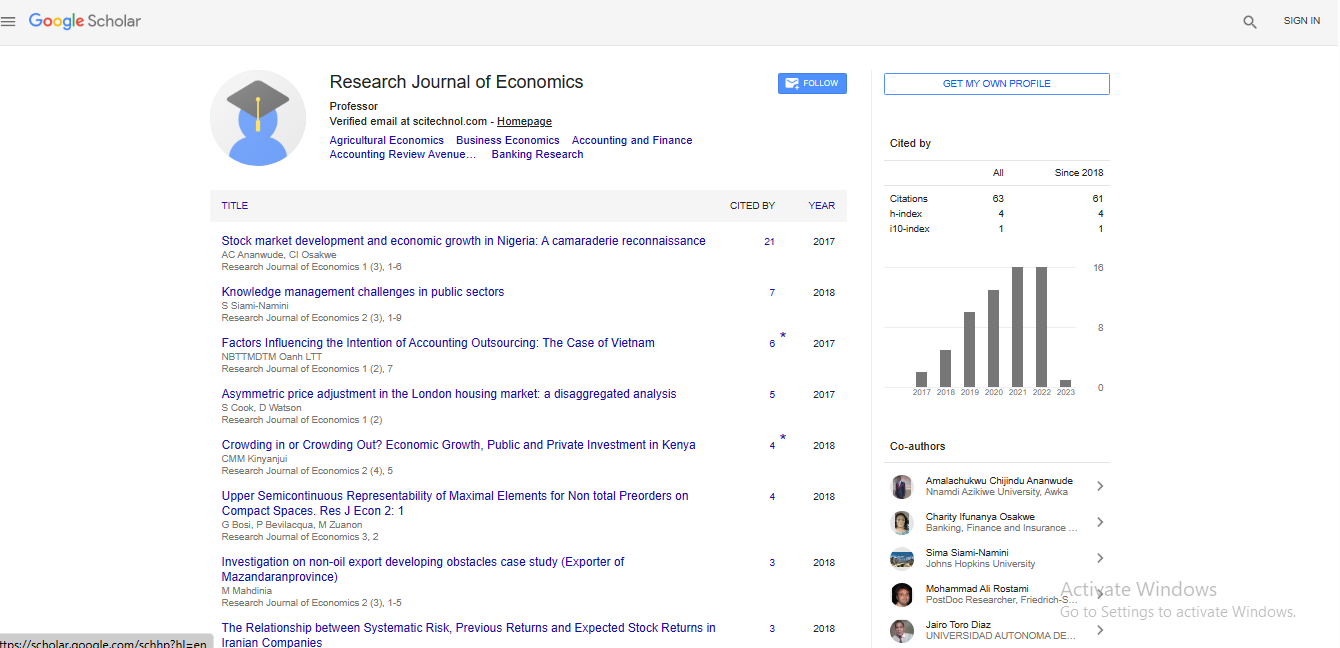Commentary, Res J Econ Vol: 7 Issue: 5
An Overview on Social Economics: Its Challenges and Future Directions.
Denise Long*
1Department of Human Sciences, Sam Houston State University, Texas, USA
*Corresponding Author: Denise Long,
Department of Human Sciences, Sam
Houston State University, Texas, USA
E-mail: longDen_ise089@uit.edu
Received date: 01 September, 2023, Manuscript No. RJE-23-117596;
Editor assigned date: 04 September, 2023, PreQC No. RJE-23-117596 (PQ);
Reviewed date: 18 September, 2023, QC No. RJE-23-117596;
Revised date: 25 September, 2023, Manuscript No. RJE-23-117596 (R);
Published date: 02 October, 2023 DOI: 10.4172/RJE.1000166
Citation: Long D (2023) An Overview on Social Economics: Its Challenges and Future Directions. Res J Econ 7:5.
Description
Social economics is an interdisciplinary field that examines the relationship between society and the economy, delving into how social factors influence economic decisions, outcomes, and policies. Unlike traditional economics that emphasizes rational self-interest and individual behavior, social economics emphasizes the importance of social norms, institutions, culture, and collective actions in shaping economic processes. This note aims to explore the key concepts, theories, and implications of social economics, highlighting its significance in understanding and addressing societal challenges.
Key concepts in social economics
Social norms: Social economics recognizes that societal norms influence economic behaviors and choices. These norms can range from ethical considerations in business to cultural attitudes towards savings and investment.
Social capital: Social capital refers to the value derived from social networks and relationships. Trust, reciprocity, and cooperation among individuals and groups are considered critical components of social capital that impact economic performance.
Institutions: Social economists examine how formal and informal institutions, such as laws, customs, and traditions, shape economic behavior and outcomes. These institutions provide the framework within which economic transactions occur.
Social justice: Social economics places a strong emphasis on the distribution of wealth and resources in society. It examines the impact of economic policies on marginalized groups and aims to promote greater fairness and inclusivity in economic systems.
Theories in social economics
Behavioral economics: Behavioral economics, a significant component of social economics, challenges the traditional assumptions of rationality in economic decision-making. It explores how psychological biases and heuristics affect choices, leading to deviations from rational behavior.
Game theory: Game theory analyzes strategic interactions among individuals or groups. Social economics uses game theory to understand cooperation, competition, and collective actions, shedding light on phenomena like the tragedy of the commons and public goods provision.
Social exchange theory: This theory examines how individuals calculate costs and benefits in social interactions. It helps explain patterns of cooperation and reciprocity in various economic settings.
Social economics and public policy
Social economics plays a crucial role in shaping public policy by providing insights into the impact of policies on different societal groups. Some key areas of policy focus include:
Poverty and inequality: Social economics offers perspectives on poverty traps, income distribution, and social safety nets. Policymakers can use this knowledge to design targeted interventions to alleviate poverty and reduce inequality.
Employment and labor markets: Social economists analyze the dynamics of the labor market, including issues like unemployment, wage disparities, and worker rights. This knowledge can inform policies that promote decent work and social protection.
Environmental sustainability: Social economics explores the relationship between economic activities and environmental outcomes. Policymakers can draw on these insights to develop strategies for sustainable development and climate change mitigation.
Despite its valuable insights, social economics faces some challenges. One concern is the integration of social factors into mainstream economic models. Additionally, measurement issues and the complexity of social phenomena present methodological challenges.
The future of social economics lies in further integrating insights from psychology, sociology, and other social sciences into economic analysis. Collaboration between social economists and policymakers can lead to evidence-based policies that address pressing societal issues effectively.
 Spanish
Spanish  Chinese
Chinese  Russian
Russian  German
German  French
French  Japanese
Japanese  Portuguese
Portuguese  Hindi
Hindi 